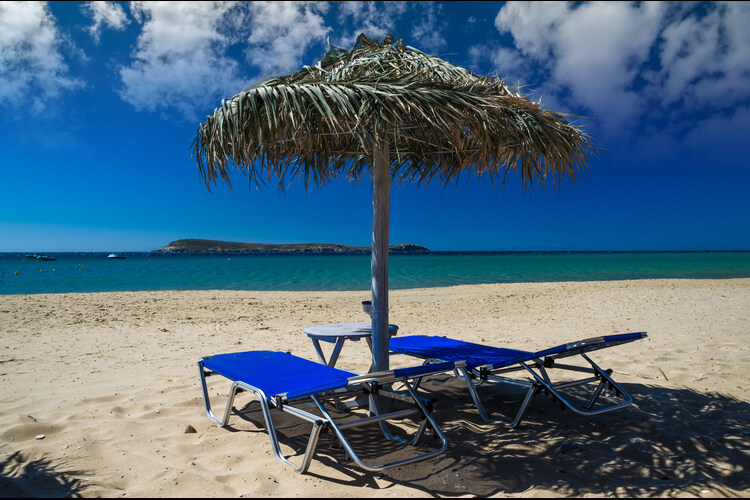
As mass tourism and sun loungers crowds out Greek beaches a beach towel tevolution takes hold as locals demand their beaches back
By
It’s early summer on the Greek island of Paros. The sky is a cobalt blue, and the warm waters surrounding the island a tinge of aquamarine. In many respects, this is the nicest time of year on Paros. The wave of high summer tourists has yet to arrive, and the white-wash streets of the main town of the island, which is also called Paros, remain quiet. But despite the semblance of tranquillity before the hectic high summer, some of the locals are already feeling hot and bothered. They want their beaches back.
It’s a feeling that many people who have grown up in, or lived in, a popular tourist destination can relate to. A feeling that the masses of summertime visitors have more rights than the permanent residents. And, despite knowing that economically, they are almost totally reliant on the influx of summer tourists, the people of Paros have had enough.
The Greek constitution states that beaches and other natural areas belong to the citizens of Greece. Yet, on Paros, as with so many other Mediterranean beach destinations, beach bars, restaurants, and hotels have laid out pay for sun loungers and umbrellas across the sand, preventing those (local or tourist) from sitting down and enjoying the beach for free. It was in May of this year that a discussion began on Paros about the dwindling number of beaches where people could just come and plonk themselves down on a towel without being forced into paying high prices to use a sun lounger. A Facebook group was created and public protests followed.
Businesses in Greece are supposed to have a licence in order to put up sun loungers and umbrellas on the beaches, and the zones in which they can do this are very limited. However, the problem, so the protestors on Paros say, is that official checks are rare and so businesses spread sun loungers over a far larger area of beach than they’re supposed to and, in the process, leave no room for those who want to enjoy the beach in a more natural state, and one that’s free of charge.
Once the Paros protest members started using drones to photograph the actual distribution of sun loungers compared to what their officially designated area was supposed to be, the scale of the problem started to become clear. According to protestors on Paros, in some parts of the island, the sun loungers were taking up to ten times more beach than they were legally allowed.
Over the course of the summer of 2023, the Paros protests grew and Greek media began to cover the protests. This led to disgruntled locals on other busy tourist islands launching their own protests.
By early September 2023 what had started as a local campaign had become a national campaign and then, with the idea of a Beach Towel Revolt striking a chord elsewhere, the protests spread to busy beach resorts in Turkey.
As autumn starts to lay a golden beach towel across the Greek archipelago, the protests are starting to expand their scope into not just a protest about a lack of free beach access but about over tourism and development in Greek beach resorts in general.
In an echo of the calls to control tourism in places such as Venice and Barcelona, locals on many Greek islands say that mass tourism has inflated local prices to such an extent that locals can hardly afford to live there anymore and that finding a house to rent has become a struggle as so many have been turned over to short term holiday lets through companies such as AirBnB.
Winter is likely to bring an element of silence to the Beach Towel Revolt but summer 2024 already looks like being a hot one in the Mediterranean as demands to control tourism continue to rise.




